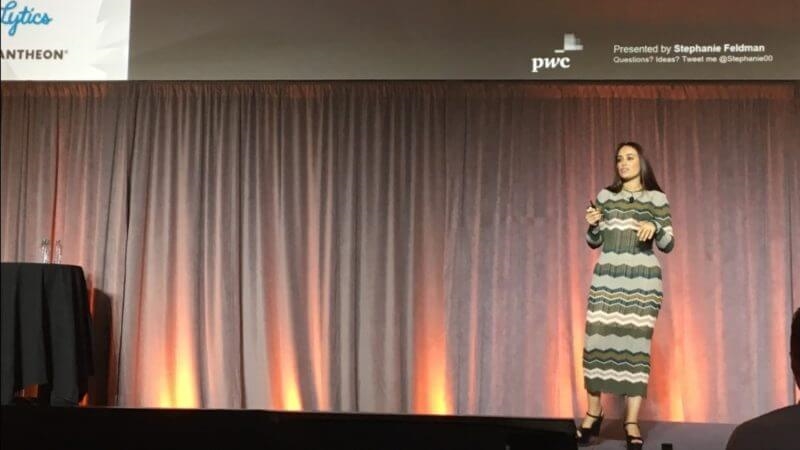To enable digital transformation, PwC set about changing employee mindsets
The company’s martech has become exponentially more valuable since introducing new processes to address digital transformation challenges, according to digital services marketing leader Stephanie Feldman.

PwC digital services marketing leader Stephanie Feldman on the keynote stage at the MarTech Conference.
SAN JOSE, CA — “If I do my job right, it will go away because digital should be foundational and part of everything.” That’s what Stephanie Feldman said during her interview to become PwC’s digital services marketing leader two years ago.
Fast forward a year into her career at PwC, in spite of all the technology and data at its disposal, the company still had not met its digital transformation goals.
“We had to do something that people cared about,” said Feldman during her keynote presentation at the MarTech Conference in San Jose Friday. She knew a true digital transformation would require inspiring PwC’s workforce to embrace it.
Changing the mindset
Feldman’s plan consisted of three steps, the first of which involved changing employee mindset about technology.
“We fundamentally had to change mindsets and we did,” said Feldman. The company introduced a “BXT” process that tied together business, experience and technology, looking at company challenges from a holistic view. Part of the new process was finding new ways to get people thinking creatively.
“We were not going to rely on anything we’ve done in the past,” said Feldman.
Creating a different model
Feldman previously had worked for a PR firm, running massive social campaigns. She leveraged her agency experience at PwC to tackle projects by bringing together writers, editors and designers.
The model worked, and now two years later, it’s used across many of PwC’s internal teams.
Part of the approach even included encouraging people to be comfortable in their environments — for example wearing casual clothes or jeans versus a business suit to work.
“Because when you’re comfortable, you’ll have that new layer of creativity,” said Feldman who keeps a “check your egos at the door” rule.
Skills and tools training was a must
Feldman knew it wasn’t going to be as easy as saying hey, we’ve got new technology, use it!
“We knew that wouldn’t work,” said Feldman. She had to give people a way to grow in their careers as part of the incentive to adopt new technology.
PwC introduced a company-wide digital fitness assessment app. To get all 50,000 employees onboard, the company said it would close the office the week of July 4 if everyone completed their assessment by a specific date. Feldman said she did not do as well as she anticipated, but that it offered an opportunity to have honest conversations about the digital transformation efforts.
“If I lead marketing for the digital business and got a bad score, we may be in trouble,” said Feldman. The test shed light on vulnerabilities and ignited conversations between team members.
Digital transformation is a long game
“Change management is hard,” said Feldman, “Nothing is built overnight, but we can all have small victories along the way.”
Since introducing the BXT approach and launching the digital assessment app, the company’s martech has become exponentially more valuable, according to Feldman. She believes marketing enablement and empowerment is about inspiring your team and providing individuals with the opportunity to learn based on their specific work style.
“If you lead anyone, it is your job to come out of [this conference] and empower those people, because special things will come out of that interaction.”
This story first appeared on MarTech Today. For more on marketing technology, click here.
Marketing Land – Internet Marketing News, Strategies & Tips
(50)



